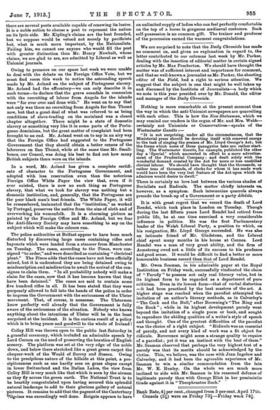Mr. Owen Seaman, in his admirable paper at the Royal
Institution on Friday week, successfully vindicated the claim of " Parody " to possess not only real literary value, but in its highest form to be regarded as a department of pure criticism. Even in its lowest form—that of verbal distortion —it had been practised by the best masters of the art. A higher stage was reached when the parodist attempted the imitation of an author's literary methods, as in Calverley 's " The Cock and the Bull," after Browning's " The Ring and the Book" ; while in its highest development parody went beyond the imitation of a single poem or book, and sought to reproduce the abiding qualities of a writer's style of speech and thought. One of the greatest difficulties of the parodist was the choice of a right subject. " Ridicule was an essential of parody, and not every kind of work was a fit object for ridicule. Reverence might seem a strange quality to require of a parodist ; yet it was an instinct with the best of them." Mr. Seaman observed that perhaps the very highest test of a parody was that its merits should be acknowledged by the victim. This, we believe, was the case with Jean Ingelow and Calverley, and it had been the agreeable experience of Mr. Seaman to win a similar commendation from the late Mr. W. E. Henley. On the whole we are much more inclined to side with Mr. Seaman in his reasoned defence of legitimate parody than with George Eliot in her pessimistic tirade against it in " Theophrastus Such."














































 Previous page
Previous page